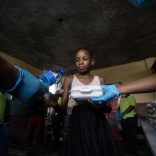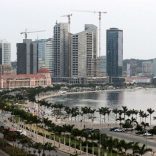Angola: President to close EurAfrican Forum in Portugal late July
Guinea-Bissau: Prosecutor requests lifting of PAIGC leader’s parliamentary immunity

File photo: Lusa
The Bissau-Guinean Attorney General’s Office (PGR) has requested the lifting of parliamentary immunity of the deputy and leader of the African Party for the Independence of Guinea and Cape Verde (PAIGC), Domingos Simões Pereira, but lawyers say this is “political persecution”.
“It is clear that it is political persecution, because in the request we realise that there is no reason to make the request,” Suleimane Cassamá, from the PAIGC lawyers’ collective, told a press conference at the party’s headquarters in Bissau.
The request to lift parliamentary immunity was sent by the Public Ministry to parliament on 24 June.
The document asks to hear MP Domingos Simões Pereira on suspicion of crimes related to “incitement to war”, “two financing contracts” with banking institutions and “misappropriation of fishing resources”, “corruption, embezzlement and nepotism”, “lack of transparency in the award of public contracts” and “application of funds not intended for the payment of non-salary expenses”.
The request states that part of those crimes were denounced by former Bissau-Guinean head of state José Mário Vaz, during a speech in August 2015 and which culminated in Domingos Simões Pereira’s resignation as prime minister.
“I should first of all ask José Mário Vaz to present evidence. It was not clear what the matter was. It seems as if they were looking for a needle in a haystack,” the lawyer stressed.
Following the request, on Friday, parliament’s ethics commission handed the speaker of parliament its unanimous decision not to waive parliamentary immunity for MP Domingos Simões Pereira for lack of sufficient elements, a source in parliament confirmed to Lusa, causing disagreement over the analysis of the law.
According to lawyer Nelson Moreira and MP for the Movement for Democratic Alternation, quoted in the local press, the final decision rests with the parliament plenary.
“The deliberations of the assembly are taken by absolute majority, here we are not talking about a situation of loss of mandate, we are talking about parliamentary immunity,” he said.
The PAIGC’s lawyers’ collective takes a contrary view.
At the press conference, the lawyers said that “nobody wants to take refuge behind parliamentary immunity”, stressing that a “political persecution in an unacceptable way” is taking place.
On whether or not the final decision to waive parliamentary immunity falls to parliament, the lawyers said that it is the ethics committee that makes the decision, and that the plenary session will only analyse it if it is in line with the request of the Public Ministry.
In other words, if the ethics commission had decided to lift parliamentary immunity, the matter would proceed to the table and only then would the MPs vote for or against lifting parliamentary immunity, they explained.
In December 2020, the attorney general’s office of Guinea-Bissau issued an international arrest warrant against Domingos Simões Pereira, who at the time was in Portugal, but Interpol refused to execute it, stressing that the organisation is prohibited from “carrying out any intervention or activity of a political, military, religious or racial nature.”












Leave a Reply
Be the First to Comment!
You must be logged in to post a comment.
You must be logged in to post a comment.